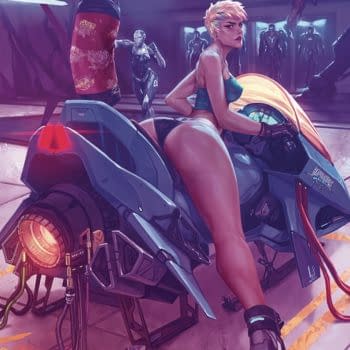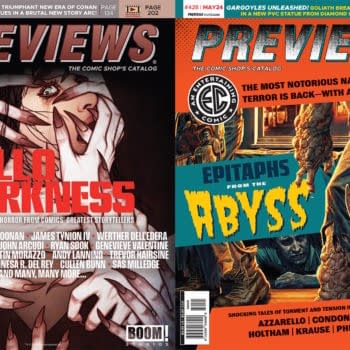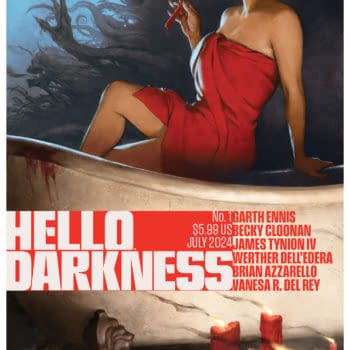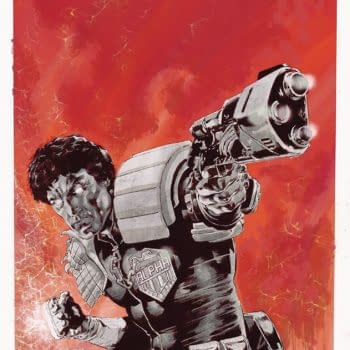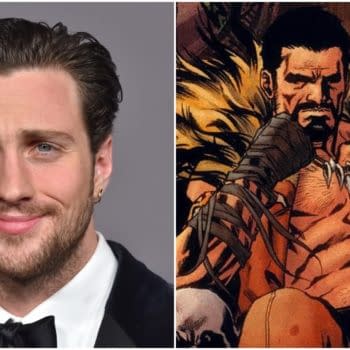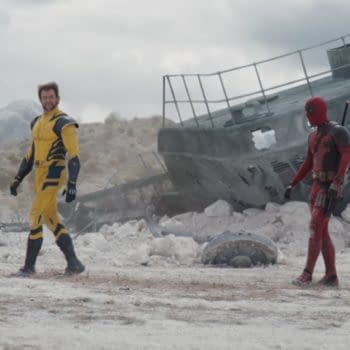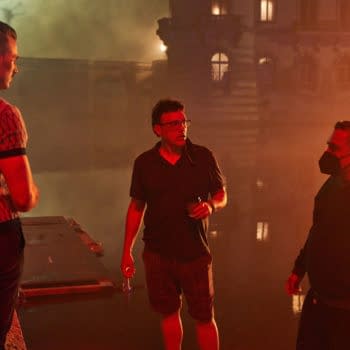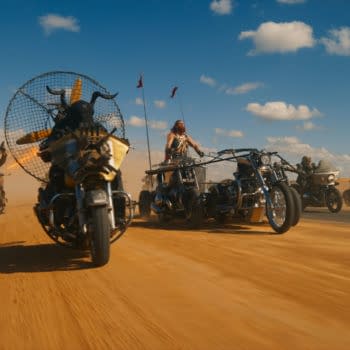Posted in: Movies | Tagged: Comics, entertainment
Steve Blum – From Out Of The Mailroom
Marco Lopez writes,
Steve Blum is such a well-known and beloved voice actor. He's got one of the most recognizable voices on the planet and he's done it all. From movies to TV, video games, and anime. He is the man responsible for bringing such great characters to life like Zeb Orrelios in Star Wars: Rebels, Starscream in Transformers RID to working on movies like Boxtrolls and Hotel Transylvania 2 and voicing beloved characters in video games and anime such as Captain Foley in Call of Duty, Wolverine in numerous Marvel games, Captain Harlock in Cosmo Warrior Zero, Kazuma in S-CRY-ed, Darcia in Wolf's Rain and so many others. The man is Spike MOTHERFREAKING Spiegel from Cowboy Bebop and TOM the robotic host of Toonami.
If that doesn't get you excited to read this interview I don't know what will. I wasn't even planning to interview him. The fantastic Ashley Jimenez of Carma PR who was working the convention hit me up and asked me if I would be interested and I wasn't gonna be a fool and say no. It was one of the best interviews and a great experience.
Now with the introduction out of the way how bout you check the below and enjoy?
Marco: What is it that made you fall in love with voice acting and how did you get your start in the business?
Steve: Well going to back to when I was I child, I think voice acting was sort of an automated response to life and sort of a defense mechanism. I didn't know it was voice acting at the time, of course, it was the only sense of power I felt as a child. I was overweight, insecure, I was bullied a lot and I had the ability to change my voice and I used that as a self-defense weapon, so not only did I fall in love with being able to manipulate my voice and become different characters, I could use it to defend myself, especially in middle school when people started pushing their personalities on one another. So, that just kind of carried with me and I didn't even realize that I was a voice actor until I had been professionally voice acting for ten years and it was pointed out to me in a panel. I considered myself, I don't even know what title I gave myself, I'd done anime for ten years, and I was sitting on a panel one day and talking about the other people who do this and how I was the only person I knew who wasn't classically trained as an actor before I became a voice actor. The director of a show I was working on at the time, named Mary Elizabeth McGlynn, she sorts of stopped me in mid conversation and looked at me and said, what do you think you've been doing all these years? It was a big revelation for me and it didn't click in until then, that I've been doing all the same work everybody else does, just in the field. I learned by working with my peers, stealing basically everything I could from them.
Being the idiot that I was doing grunts and creature noises almost involuntarily through most of my life, I was working in the mailroom of a low budget film company, it was called Empire Entertainment, we made movies like Re-Animator, Ghoulies, The Puppet Master movies later. I got a day job working in their mailroom and the head of the mailroom was casting a quote/unquote Japananimation program and was looking for a guy with a deep voice to do creature work, and I happened to have the deepest voice in the mailroom and he asked me if I would be interested in coming into audition on the weekend.
So, Saturday morning he offered me free breakfast and lunch and that's all I needed to hear, I didn't care what the job was, I was terrified to think it might be an acting thing, I had no experience but free breakfast and lunch hey, I don't care. So, we go to this crazy studio and they showed me some footage of a creature ripping the arm off another creature and they said what would that sound like? So, I gave it a go and they said ok, you're hired. They booked me for twenty-six episodes of a show called The Guyver and I just did it because I loved to do it. The people that were running that show picked up other shows and they kept hiring me, kept giving me other parts and I did it for fun, I never expected it to become a career. I kept that job at the film company and over the next fifteen years or so I became an executive at that company, I was head of marketing, doing voice over on the side just for fun and somehow it became a career.
After working fifteen years at the film company the personal changed there, it became much more corporate and I hated going to work every day, I found myself defending the vendors and trying to do the right thing in a world where that was very difficult to do in entertainment, when everybody else is just cutting each other's throats, for the next thing, using budgets incorrectly. I hated that aspect of it, it felt seedy and I wanted to feel good about myself at the end of the day and at forty years old I booked a 7-Eleven commercial and I thought that was my ticket out, I thought that was going to build my house for me and as it turned out it wasn't as lucrative as I thought it would be. Then the union went on strike for eight months, I was out of work for a year and a half and I got another taste on how difficult it was to make a living at voice acting, living on credit cards for that year and a half while I had to find other odd jobs to support myself and my family but again, I kept doing it because I loved it and I never lost sight of that and I think that's what has carried me through these years. Yes, to this day I do make a good living at it but my primary reasons and focus for going to work every day are I like creating art, I like being in this community of voice actors who take care of each other, which is sort of an anomaly in the entertainment business.
Marco: During your long career, has there ever been a time where you chased a certain role that you wanted or do you simply wait for the gigs to come in?
Steve: Yeah, I've never been one of those guys who chases things down. There are so many people who are so good at this that if there are big roles that are coming up, even if I think I might be right for them or I lust after them a little bit, I feel like I'm just going to go through the audition process like everybody else so everyone has an equal shot at it. If I get it, I get it and if not, I'm fine with that. I learned very early in my career from a guy named Jack Angel, a great voice actor, please look him up, he told me the audition is the job, so if I can audition for these characters, that's enough for me, that fulfills me enough. If I book it after the fact, that's just gravy. I'm surprised when I get booked for these parts, the only exception to this would be early on in my career I thought I would be right for Batman, just because of my natural voice print, and then I hear Kevin Conroy's version of Batman and I think no, I can't do better than that. But that's kind of been my approach for my entire career and even if I had the opportunity to play some of these other well-known characters, in this case, I always know who is playing the character, who has played the character up to that point and I'll call them and ask them why they're not auditioning for this or why they haven't already booked this role. That's just what we do in the voice acting community, it's great like that.
Marco: I have a couple of friend who are trying to get into voice acting. So, they would kill me if I didn't ask this. What would you tell people who want to make voice acting a career, maybe something that would have helped you when you were first starting out?
Steve: Well because I didn't look at it as a career, I don't feel I missed anything, I feel like I did it the hard way. I wouldn't recommend my path to anybody but I don't feel I did it the wrong way, I don't regret the way I did it because I appreciate it so much now. But for new actors coming in and they know that this is what they want, the very first piece of advice I would give them is to do it because they love it, not to do it for fame or fortune because chances are neither one of those things will happen. Even if they do, they're very hollow if you don't do it for the right reasons in the beginning and you must maintain that love for art as the number one priority.
One thing I didn't know going in was how many people are affected by the work that we do. I thought I'm farting and spitting into a microphone in a vacuum and I don't know how it's going to be perceived out in the world, I really didn't care, I just loved to do it, especially back in the anime days, we were working by ourselves in a booth and then coming out to conventions like this and having conversations with people, hearing stories of autistic children speaking for the first time because they're relating to a character I voiced, I can't take credit for that but being part of that process of somebodies social evolution, that to me is the purpose of doing this, sort of redefined my reason for doing this.
I've spoken to guys in the military who, when they've played games like Call of Duty and inherently it's a very violent game but on the battlefield when they're in Afghanistan, off on some horrible mission, the only thing they want to do is come back to their tent and play Call of Duty because it gives them a sense of home and community with their friends. That's something I never even considered a possibility as the after effect of doing this work and so I do encourage people when they are getting into this for the first time to consider what they're doing is a service job, their role is not to be famous, their role is to be of service to their audience and to do the best possible job that they can so the audience can connect to them.
Marco: The fact that you bring comfort to people who are doing the jobs some of us would never do, that is amazing to hear.
Steve: It was a shocking revelation to have these conversations with these guys, I never expected that and now, like I said, it's completely redefined my purpose of being here, of doing this work.
Marco: Has it ever bothered you how some people don't seem to take voice actors seriously, as opposed to say actors on television or in the movies?
Steve: I'm not offended by it, it's funny, it's a common thing for us but the only thing I will do is I'll gently correct someone if they say you know, I like you as much as real actors. The 'real' actors come into the voice over rooms and say, this is real acting, this is hard, this isn't easy, we have to create something without props but this is acting. Every element of this is present in every form of acting so I'll do a gentle course correction there but other than that I don't care, it doesn't affect me, I didn't even know I was an actor ten years ago.
Marco: What do you think about what's going on right now in not just the video game industry, but the strike and the L.A. Weekly article about voice actors and their salaries?
Steve: I've been very active in all of this. My personal input into the whole negotiating process has been on vocal stress because that's what I know about more than anything as I scream a lot in video games. I was involved in a lot of those initial meetings before negotiations began and during negotiations too. It bothers me when there is disinformation disseminated, especially in that L.A. Weekly article, it was written by a guy who has an agenda. He's a big proponent of diversity in the industry, which we all support diversity, especially in voice acting. The voice acting community is one of the biggest supporters of diversity in the entertainment industry because nobody knows what you look like behind the microphone.
It was offensive and hurtful to our community that he would write something like that, saying we were doing it out of greed because this whole negotiation process didn't even begin with money as the primary factor. What we're asking for financially is secondary compensation which is based on the success of the video game, and it's a twenty-year-old contract, we're just trying to bring it into the modern age. The contract hasn't been negotiated in a meaningful way in twenty years so all we were asking for was to have a single payment bump after a game sells two million units and another one at four million and up to eight million and there's a cap there so the maximum we could make was thirty-three hundred dollars.
Now the game companies will hire celebrities to come in and stand next to us in the booth for thirty thousand dollars, doing the same amount of work that I'm doing for eight hundred and we don't complain about that because their celebrity status may or may not help the game, in most cases it doesn't and we end up having to do their clean-up work, I end up doing all their screaming and grunting in the end for scale so for me the money is really the least of it, it's really health and safety and that has been misrepresented in a horrible way.
We also want transparency in the contracts, we don't even know the names of the shows we're working on, which we like to prepare for shows, we like to know what we're working on ahead of time to mentally and physically prepare for them. It also gives our agents a negotiating tool. If it's a giant, multi-billion-dollar franchise, it's only fair our agents might negotiate a double scale payment for us, or even better in some people's cases, so that's just a common-sense thing.
The other thing was for performance capture, which isn't included in the voice over contract in the eyes of the producers, it's very much a part of this now because the performance capture artists are voice actors who are being hung from wires, twenty-five feet in the air, without the supervision of a stunt coordinator, so all we want to do is get a stunt coordinator on set to make sure that it's safe and they think that's unreasonable so we're standing up, we've been through nineteen months of negotiations in this and we have bent in every possible area that we can and this is the bare minimum at this point and they still said no and offered us a little bone of a compensation package that they thought would satisfy us but it actually ignored all of the issues entirely so we had to go on strike so I support it.
———–
Well, it's time to wrap this up. I hope you all enjoyed the interview. Let us know how you feel below. And if you have a minute check out Steve's website and follow him on Facebook, Twitter and Instagram.
And if you're a fan of his work and other voice actors support their cause. Let the video game companies know how you feel and that what they're doing to the guys and gals is wrong.
Marco Lopez is the co-owner of the website Atomic Rex Entertainment. Where you can find the ongoing weekly webcomic Massively Effective, that Marco describes as Bill and Ted in tights. Also hosted on the site is Marco's web strip series Orion's Belt that follows an Afro-Latino family of adventurers in space and his anthology series A Shot of Whiskey. Marco has also written for Zenescope Entertainment and Lion Forge Comics.








